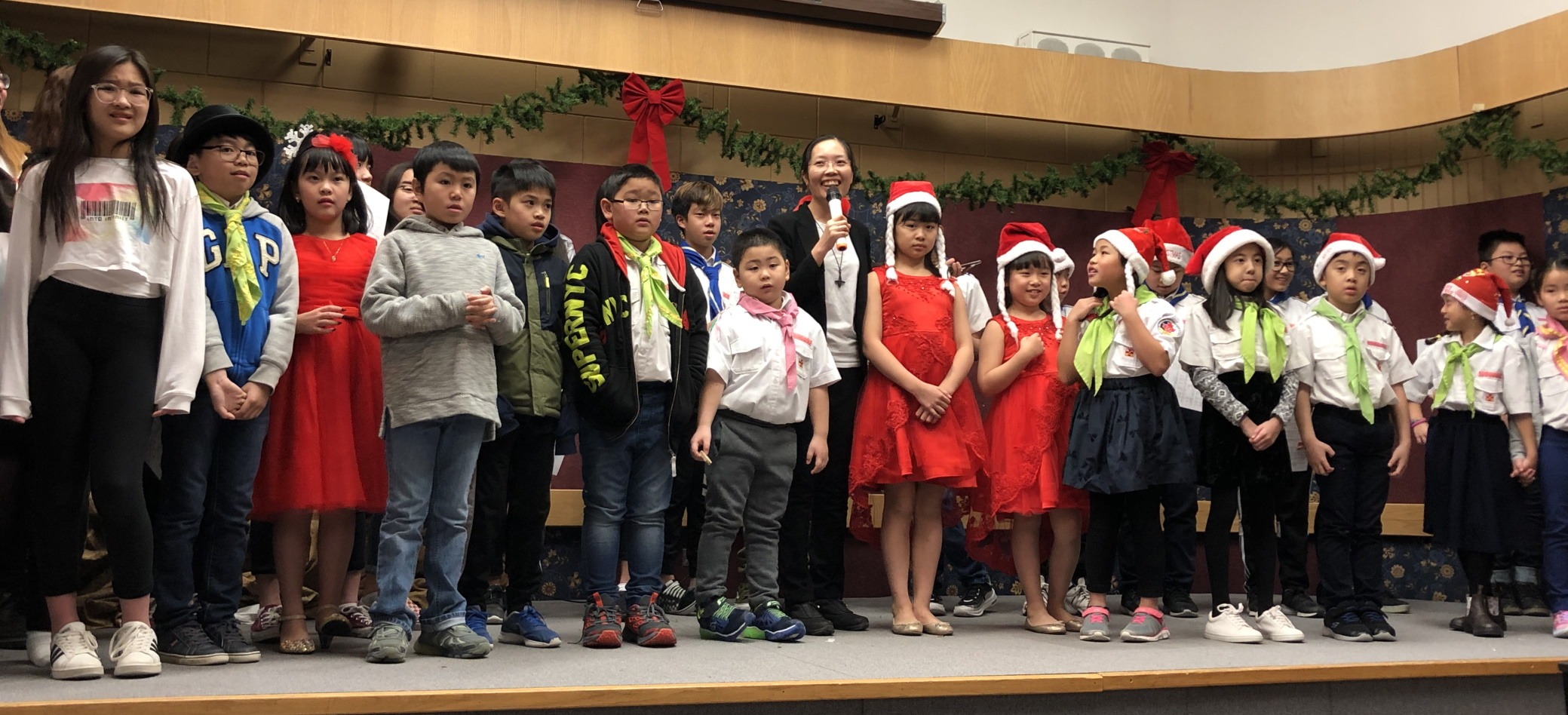

Journeys and Experiences
Celebrating Our New Mission in Canada
Volume 1, #1

On 6th April 2016, I arrived in Winnipeg, the first of the Sisters who were to come to the “new mission” with Indigenous people. That was five years ago, and much has happened in those five years. Sisters Jacinta Dkhar (2017), Nwe Ni Oo (2017), and Pricilla Lugun (2020) arrived one-by-one for the “new mission”, and Sr. Pham Thi Thuy Giang arrived in 2019 to take up her new work at St. Philip Minh Vietnamese parish.
We are still hopeful that we will receive more Sisters, once the Covid-19 pandemic has ended. In the meantime, we celebrate these first five years, and share our reflections with all the Sisters of the Congregation.
Sr. Thuong Truong RNDM, editor
Sr. Veronica Dunne RNDM, co-editor
Adventures to New Horizons
The first time I saw the snow in reality, I felt like I was in a dream. The first thought that came to me was the phrase from Psalm 148 – “All Creation, Praise the Lord; ice and snow, praise the Lord!” Filled with wonder and owe I scooped snow into my hands, and put my bare foot on it. It was cool and frozen, and I said “ah God is so awesome and wonderful!” I always admire the countless expressions of beauty of God’s creation.
St. Kateri, the church at which we work, is the only Indigenous parish in the city of Winnipeg. The city and Kateri parish are both rich in diversity and cultures.
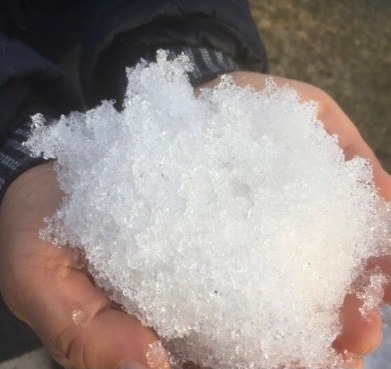
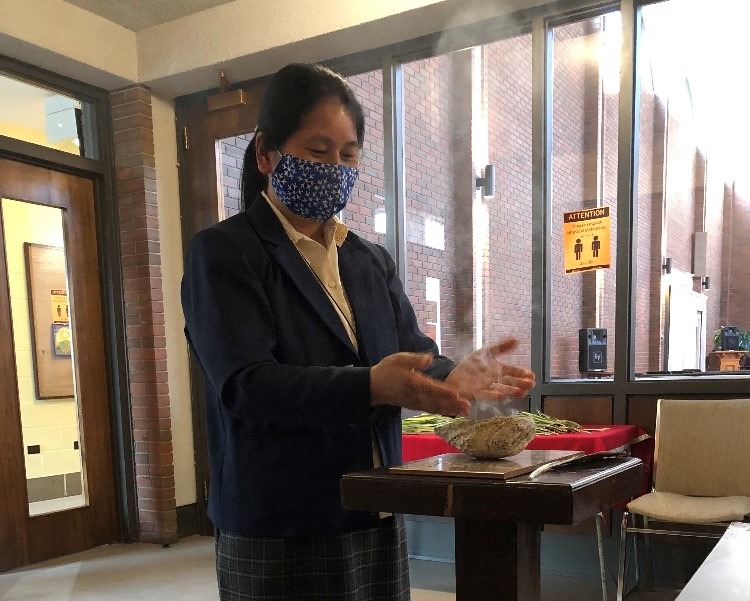
Liturgy at Kateri is based on Indigenous culture. Two examples:
Smudging at the entrance door before entering into the church for Mass or any services. Everyone lines up to take part in the ceremony. An elder from the community will greet and welcome people, and tend the smudge.
The smudge is a blend of sweet-smelling herbs and grasses known as medicines, which have cleansing and healing properties. We waft the smoke of the smudge towards us, cleansing and opening our senses, our hearts, our minds, and our whole bodies, before participating in the sacred liturgy.
A second example of integrating Indigenous culture is at the celebration of the Holy Eucharistic, is this: after the consecration, the whole congregation, accompanied with the drum songs, turns slowly through the four directions East, West, North and South – a sign to unite and connect with every race of people, every living creature, and bring all to the circle of prayer.
It is a tradition of the Kateri faith community that every Sunday after the Eucharistic celebration, all are welcome to join for soup and bannock (an Indigenous form of bread), and conversations at the table. Whoever comes, they express joy and a sense of being “at home” with everyone.
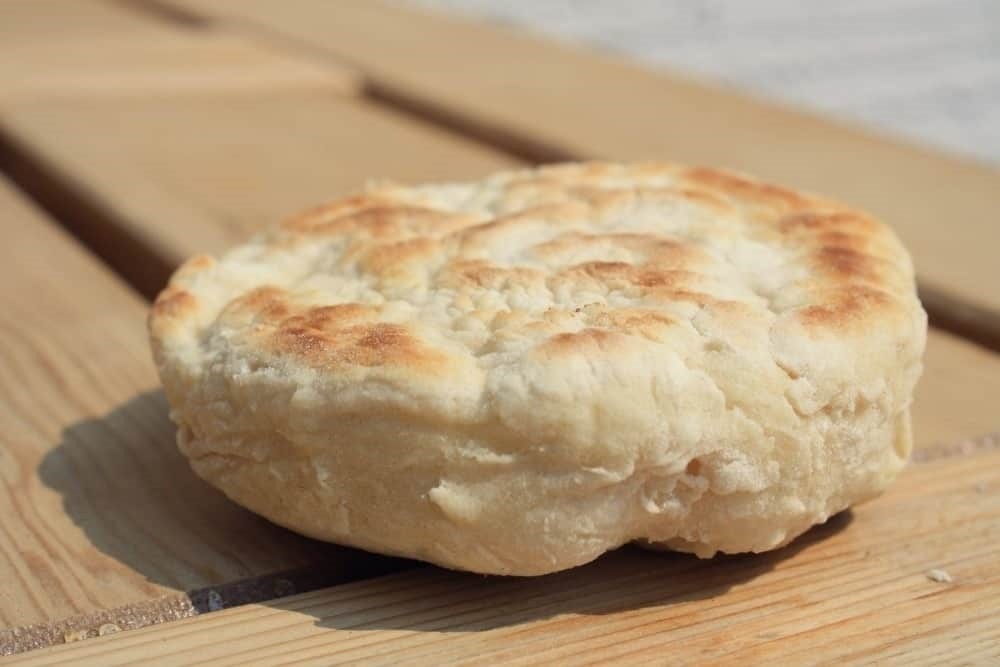
More learning experiences for me have been: 1) visiting the elderly at the care home/nursing home, 2) outreach and prison ministry, 3) baptism prep for adults, 4) being part in the team for conducting Wakes and funerals at St. Kateri Parish. This latter has taught me much about the Indigenous traditional practice/spiritual performance, of celebrating liturgy and ceremonies, as families bid farewell to their loved ones. I learned that Indigenous Wakes are moments of grace where family reunions take place through prayer services, talks and messages of condolences from the elders, the chiefs and family as well. Healing and reconciliation, acceptance and forgiveness, were taking place among grieving family members.
Also involvement with people in the parish makes me understand better the ministry of evangelization to the young children at Sunday catechism. The two-year training that I attended, the Catechesis of the Good Shepherd, is a new way of learning and teaching catechism to the children, and of helping them to grow in relationship with God right from their young age. This program has also enriched my personal faith, and deepened my journey as I live my consecrated life.
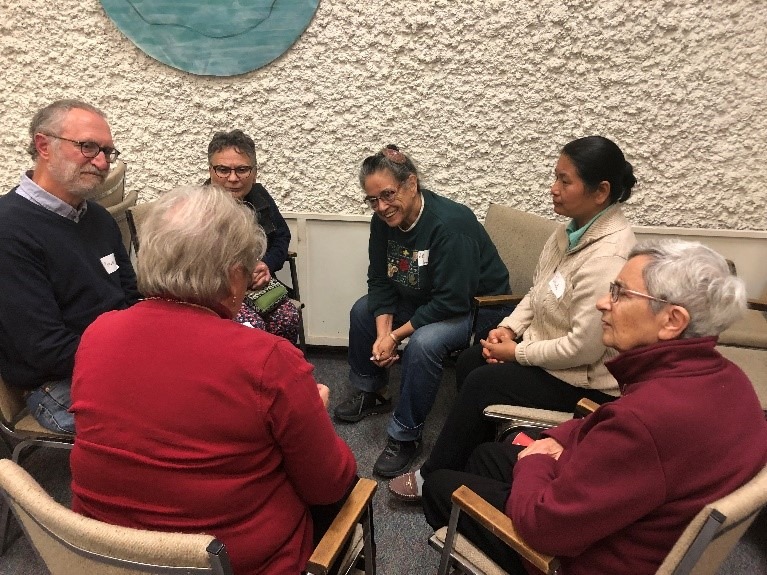
For four years, we also participated in “table conversations” on Truth and Reconciliation between the two parishes St. Kateri and St. Ignatius in the Archdiocese of Winnipeg. These sessions also helped me to better understand how to work with Indigenous people, by listening to their sharing of their stories, culture, faith and language, of learning what happened in the past at the residential schools.
In every gathering, meeting, assembly, church service, the first thing we need to remember, is to acknowledge the sacred land, to respect and honor that we are standing/meeting on this land on which Indigenous persons met for thousands of years before Europeans and other nationalities later arrived. We remember that we are all partners in the Treaties that were made on this land.
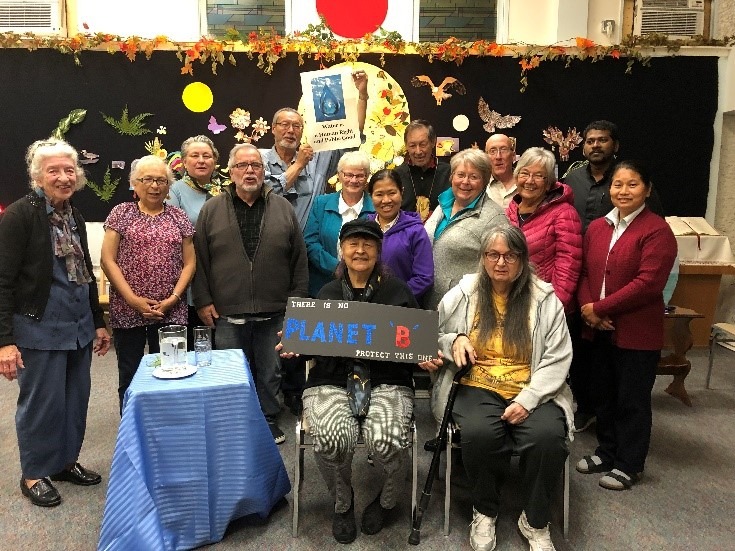
Learning is a lifelong process. In addition to all that I have written, I also got a chance to taste, observe and experience class room management at St. Gerard Catholic School with Mrs. Barb Potkonjak a Kindergarten teacher. Mrs. Barb has created a “holistic classroom” to nurture and shape the potential of a child through different activities. The children are mostly from immigrant families, from a wide variety of Nationalities. It was a rich experience to see the beauty and academic interest of each child. I would love to continue this work, and to share my gifts with them but due to the restrictions from deadly Covid-19, the School does not allow any visitors or volunteers to be involved at present.
I thank God for my faith experience with people in Kateri Parish and with my RNDM Sisters in the Province who always give a full support to begin this new mission with the Indigenous. Both missions ‘First Nation People and RNDMs Sisters’ is a Peaceful mission rich in diversity, cultures, languages, faith traditions and spirituality. This mission opens my eyes, ears and heart to receive and learn to adapt to the new ways of practicing faith, belief, spirituality, cultures, environment etc. I am further enriched to live our RNDM Charism and Spirituality with our RNDM Sisters. Their vast experiences in the fields of education, missions and other ministries in the society is encouraging.
God is good – all the time! All the time – God is good!
Jacinta Dkhar RNDM
Mission in Time of Covid-19
I arrived in Canada when covid-19 had begun spreading in only a few countries. From that time until now it has been more than a year and the virus still continues to spread. Some of our countries have been affected more and this situation is worsening.
Since I arrived during the time of pandemic most of the time I remained in the community. My community has been a great support, encouraging and helpful. For me it has been a time of learning, listening, and spending more time in prayer. This is also the time to enter into a new culture, lifestyle, food habits, weather and environment and get to know sisters and other people.
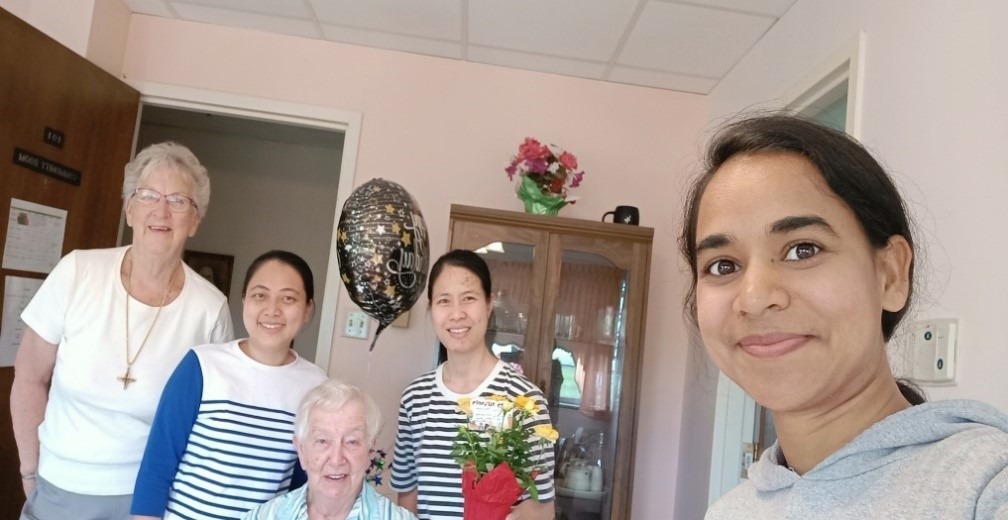
My mission here is with indigenous people (First Nation). We are not having any regular activities that usually happened. We had a few gatherings last year in the park when covid-19 did not spread and when we were not allowed hold any gatherings inside the houses or churches. Very soon government started imposing rules and regulations and especially restricted the numbers for gatherings, so we could no longer gather anymore, even outside.
In recent times we have started meeting virtually. Thanks to zoom we could connect to some and share our experiences during the time of covid-19. This was encouraging and helped us to stay connected. Having meeting virtually once in a while makes a strong bond. Also while listening to each others stories we come to know that some suffer more due to the lock down, not able to meet loved ones while some spend time creatively doing different activities. Getting connected through zoom brings joys because they can see each other. At the end of every sharing we conclude with prayer for healing, strength and ask for peace in the whole world at this time of crisis.
Pricilla Lugun RNDM
Experiences in a New Mission
I am working at St Kateri Tekakwitha Parish in Winnipeg, Canada. I teach catechism to the children, and have some additional outside ministries such as Wakes for those who have died.
I am very happy working with the parish staff and the children. Before Covid-19, I would teach the children every Sunday. We have about 10-15 children who come regularly for catechism. There are very few young people in the church; most of the parishioners are elderly and they bring their grandchildren to the Church.
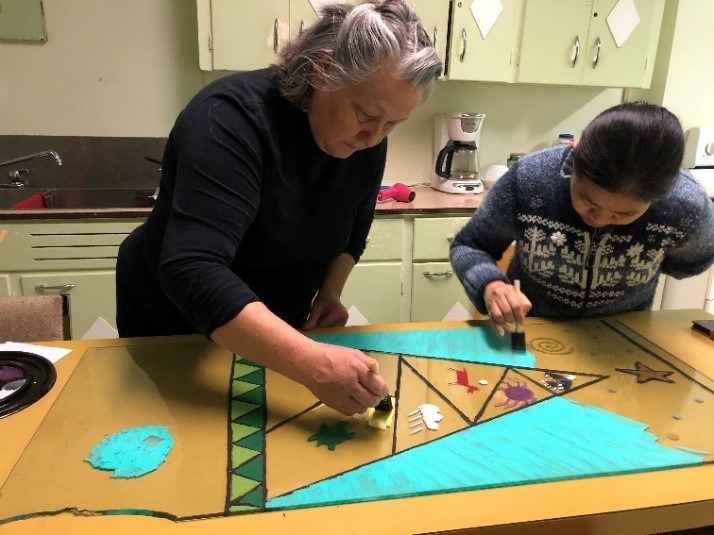
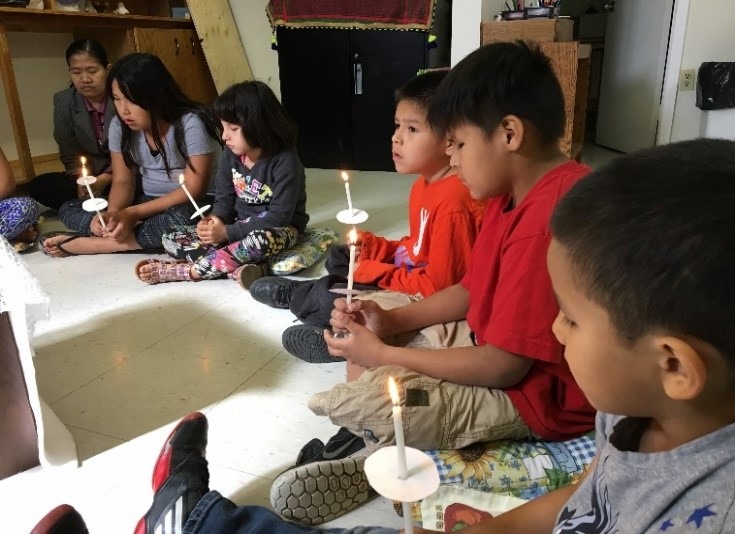
The majority of the parishioners are indigenous, some Pilipino and other Nationalities. Some of them know God but they don’t know how to make the sign of the Cross nor prayers like the Hail Mary and Our Father. The children live very far from the Church so often they are unable to come to Church. This makes it a little difficult to continue their catechism education with us. But when I see the children come to Church I am so grateful.
In my other ministries I go to prayer service, where we read the Gospel and share our experiences with each other. There are many families from outside Winnipeg like St Theresa Point and other places in the north. These people come to the city for medical reasons. Sometimes they are very lonely being so far from home, and when we go there they are very happy to see us. We also attend a Home Care Center where most of the residents are quite sick. I go for a prayer service followed by visiting, talking, and listening to them, either individually or in a group. They are able to share the difficulty and sadness they experience being sick.
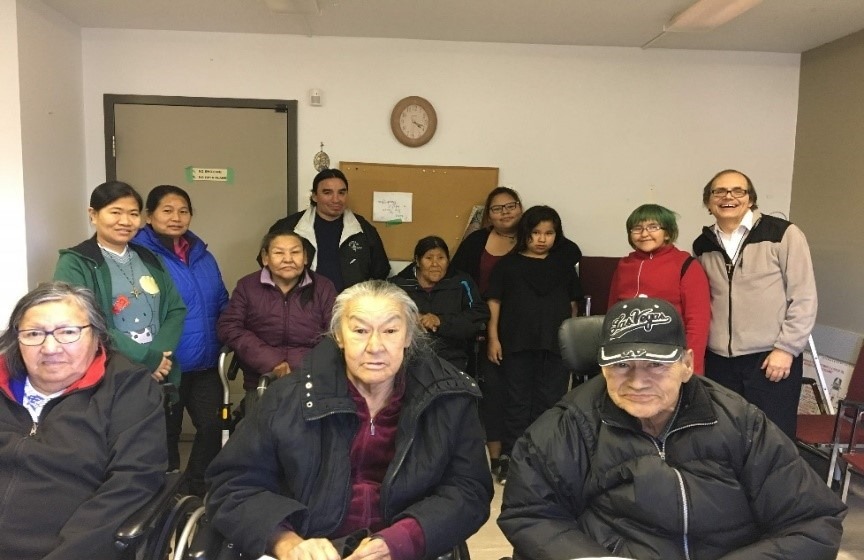
At the Wake Sessions I have learned many things about the Indigenous culture, especially their traditions on how to conduct a Wake Session and bury their dead. We are also able to share our own cultural traditions for a Wake and burial of our people. I find this exchange of experiences so interesting because we are able to share our faith and traditions.
In this time of the Covid-19 pandemic, we cannot have our usual connection with the people, but sometimes our group connects with Zoom meetings, sharing our daily life experiences, and encouraging each other with our prayer.
Nwe Ni Oo RNDM
Experience and Challenges in Adaptation
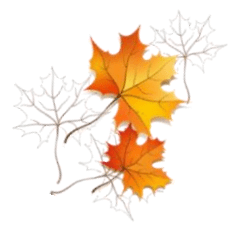
New Experiences in the Land of Maple Leaves
On June 21st 2019, after a long challenging flight, I finally reached a place called “Our Lady of the Snow”. I screamed with emotion when I first saw the “Maple Leaf” icon in the airport. Then I silently prayed “Thank you Lord for bringing me here in safety. I offer You my future, I give it all to You and I will follow Your lead”…
Community Experience
I was accustomed to listening for the ringing of a bell, getting up on time, and going to the chapel to pray together, eating regularly together, being told where to go and what to do, and asking permission from the superior. In Viet Nam I was used to this monastic lifestyle … the rules had to be preserved. I now realize that this life style helped me develop good habits, especially the need for taking time for prayer and reflection as part of my active lifestyle in ministry.
So now I live with more freedom and in a completely different environment; each person takes responsibility for her own religious life; there are no longer monastic rules, and getting permission is much easier.
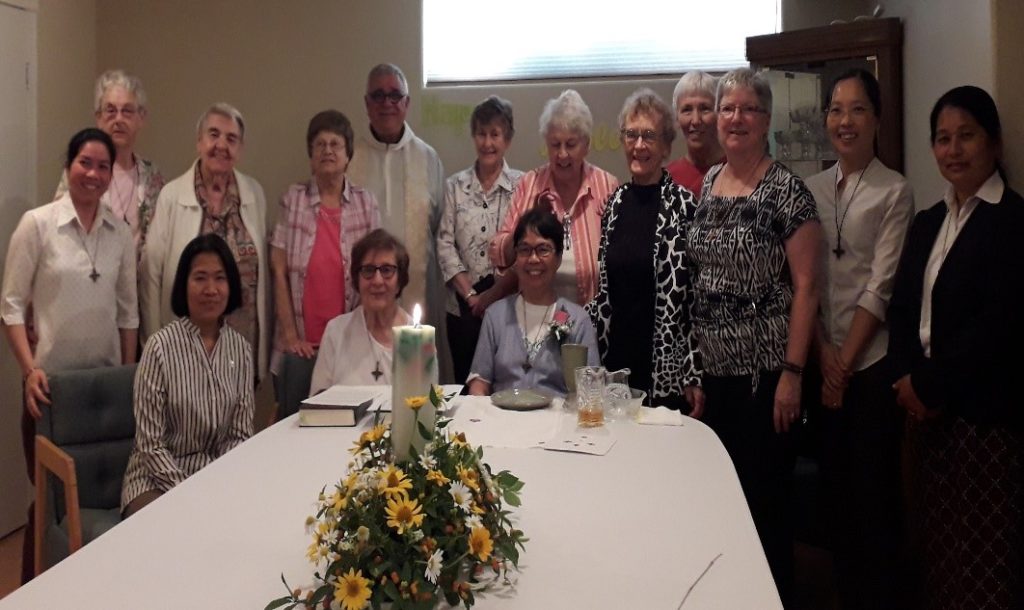
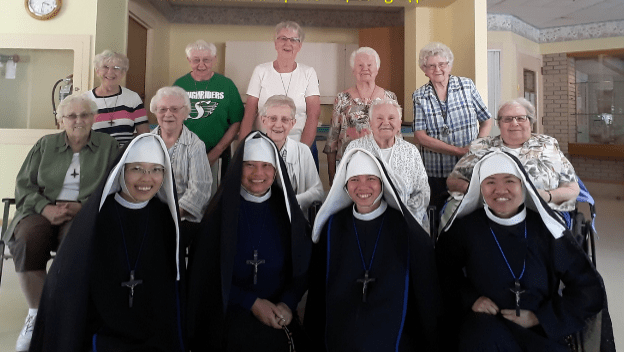
There were times when I felt tempted by this new lifestyle, but the training of the monastic life helped me to value and balance my need for recollection and contemplation with the requirements of my ministry. I discovered that through all these experiences, I have grown a lot.
Missionary Experience
I am involved in the catechetical mission in the Vietnamese Saint Philip Minh parish here in Winnipeg. There are about 500 parishioners and 170 children. This is only a very small number compared to parishes in Vietnam. However, there are also many joys and challenges in this mission.
Happiness...
When I was first introduced to the parish, many parishioners were surprised to have such a young sister! In Canada there are few young vocations, so my presence among them was a surprise! Consequently, they expected enthusiasm and young vitality from me in my parish ministry.
People here love and respect the religious priests and sisters. I am also fortunate to be loved by the parishioners here in my parish. They are very enthusiastic to cooperate in the church activities. Since the parish is small, we know each other very well. We are very close and united. The laity here are very generous in the spirit of sharing with the poor and cooperating regularly in the Mission of our Congregation.
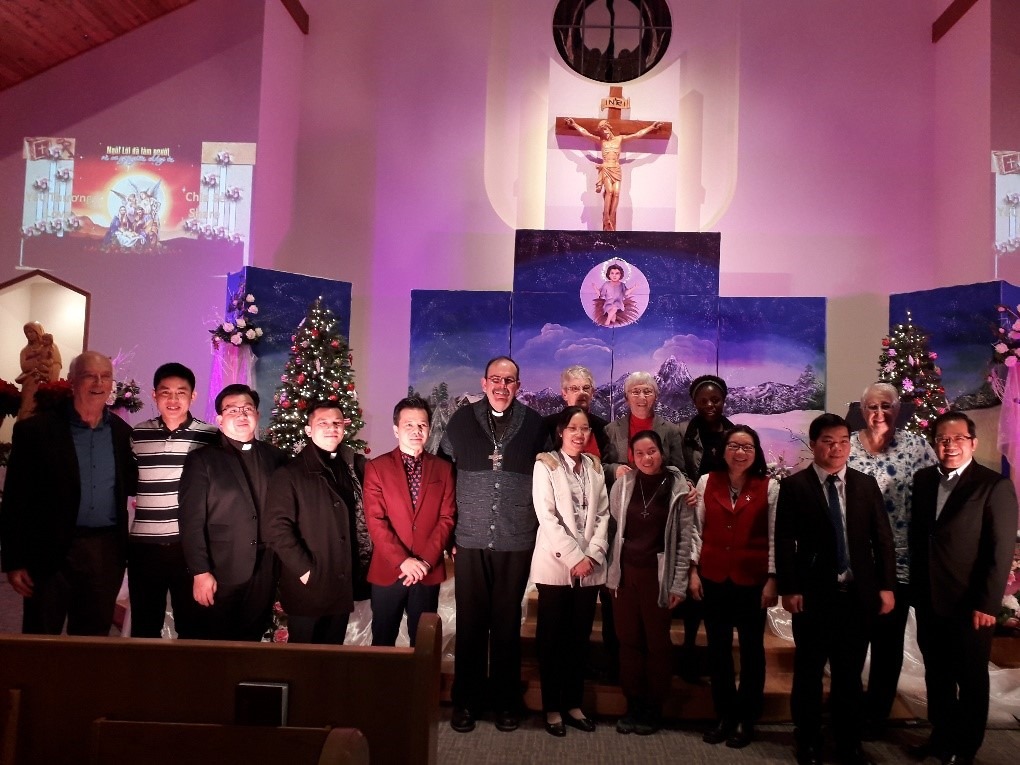
Challenges...
The generation gap and differences in the way of thinking and life style between the Vietnamese traditional middle-aged and the current youth presents a challenge for the families. It also presents a challenge for me in my ministry. A simple example of this can be seen in attendance at Mass on Sunday. Simply going to church is a challenge for some young people; consequently studying catechism and cooperating in other activities are not easy for them. This results in a lack of young collaborative staff to assist in the ministry, a big challenge for me when implementing my mission with youth. This requires me to understand their thinking and feelings, in order to discover and enter into close relationships with them. This is not an easy task.
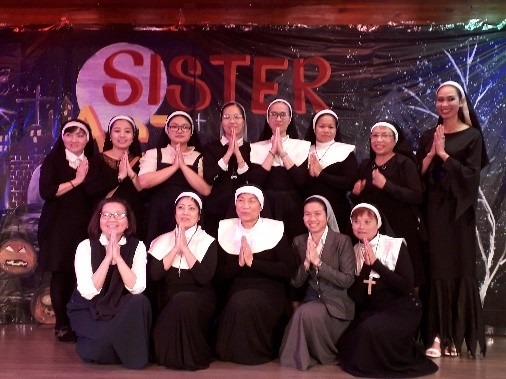
The parish policy is to maintain the Vietnamese language in the teaching of catechism; this is not easy to convey to the children. English is their first language, Vietnamese is only a second language. I find it very difficult to require Vietnamese in teaching and helping the children to understand the doctrine. Besides, English is my second language so I have to spend a lot of time reading and exploring doctrine in English. My experience is very similar to the children’s experience; we are both trying to memorize the catechism teachings in our second language.
For the first three months after receiving the mission, the parishioners and I were confused when the parish priest became ill and had to return to Vietnam for three months. Three months without a parish priest, only a replacement priest to celebrate Mass. Everything in the parish was left to me. I also felt confused and didn’t know what to do. But then everything went well and God supported my little efforts.
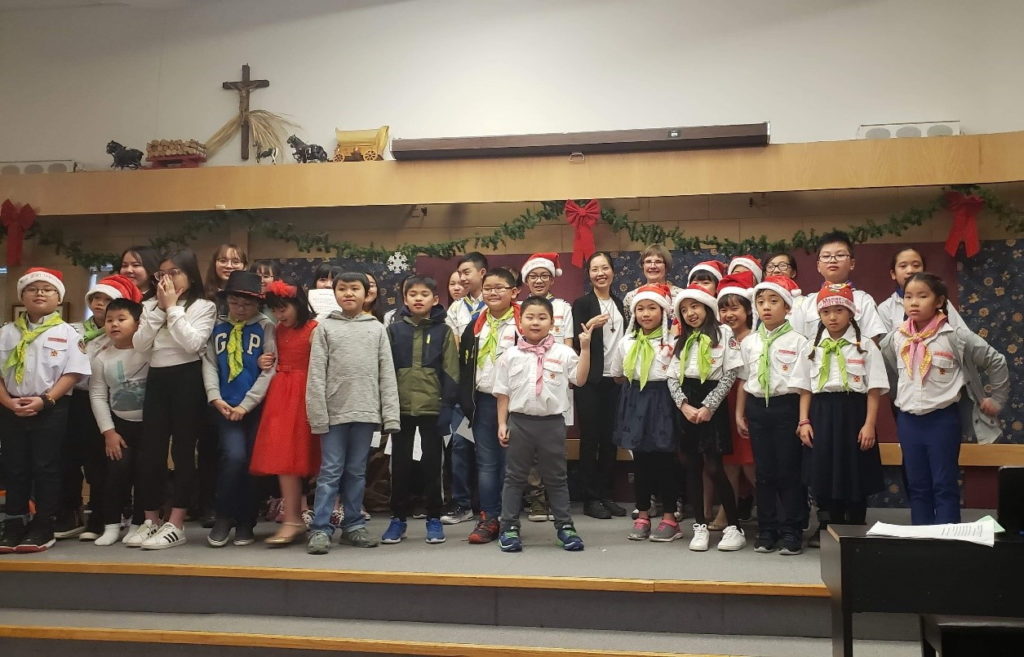
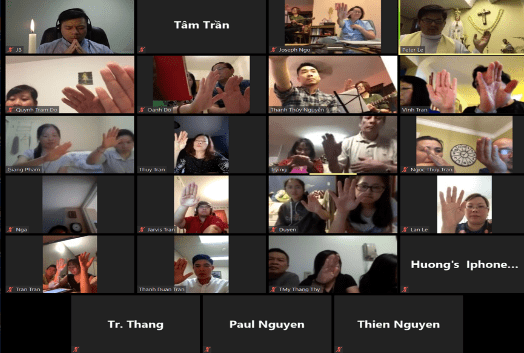
Pandemic Time...
After working for 7 months, the transitions required because of Covid 19 stopped all activities of the parish. I had to find new ways to help the parishioners and children maintain their prayer life and catechesis. This challenge required me to discover new ways to connect with people when we could no longer congregate at the church. The zoom prayer group was born. I lead and organize zoom-sharing prayer every evening. We understand each other better and love God more.
This is also an opportunity for me to bring the words of our Mother Euphrasie Barbier, Congregation documents, and Laudato Si to them. Their sharing provides me with a good chance to understand more about their life, stories, and sufferings. I recognize that even in a country like Canada which is rich in many ways, there is still both bitterness and suffering in the lives of its people.
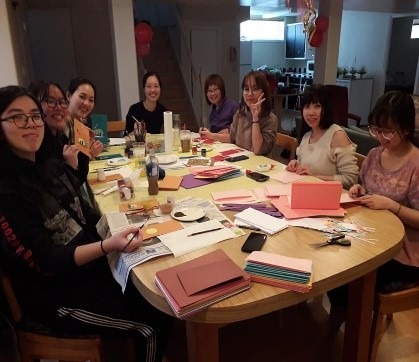
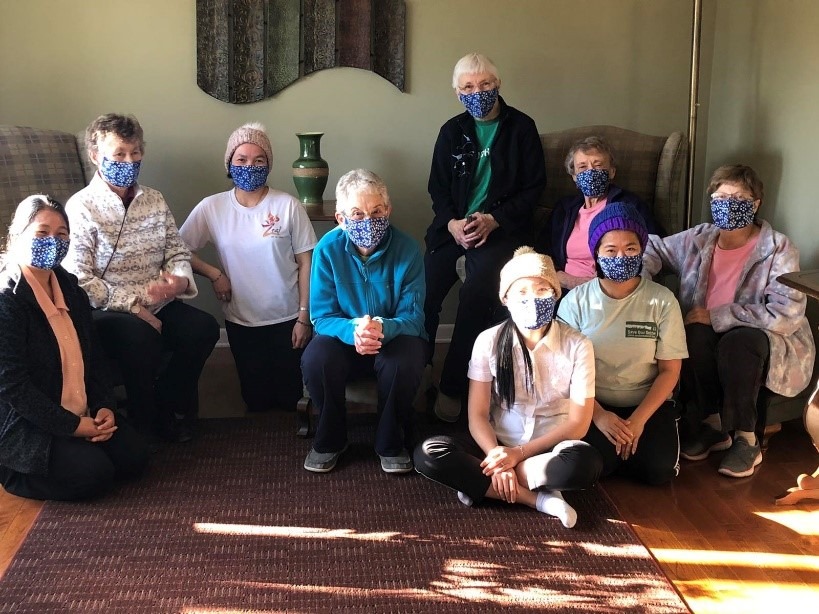
A year to look back and thank God for all God’s loving gifts and loving guidance in my life. Thank you to the RNDM Canada community who have always been by my side, lovingly supporting and listening to my sharing and praying for me.
Giang Pham RNDM
Deep Gratitude
"All is in God's hands and nothing is impossible to God"
From the bottom of my heart, I thank God for everything; God helps me through the Sisters in Canada and people in St. Kateri Tekakwitha Parish where I work. When I came here, I was very afraid and concerned about the mission because I really didn’t know what to do nor how to adapt to new cultures -customs, the extremely cold weather, and different food.
In addition, it was just one thing after another. The sisters taught me how to cook a meal, to bake a cake, and to maintain a house. They took me out and showed me how to get around in the city. My heart and my eyes were wide open to observe everything. Life was different; new experiences were flooding over me and I was soaking them all in. I could not believe the many meetings I had to attend, each on a different topic. Often I understood nothing, my head was spinning like crazy, and my mind was blank. I couldn’t hear anything. “God please, please help me”, I said. At the end of the meeting they said, “Don’t worry you will get it later”. I was very tense but I was moved by their welcoming and accepting me as I am.
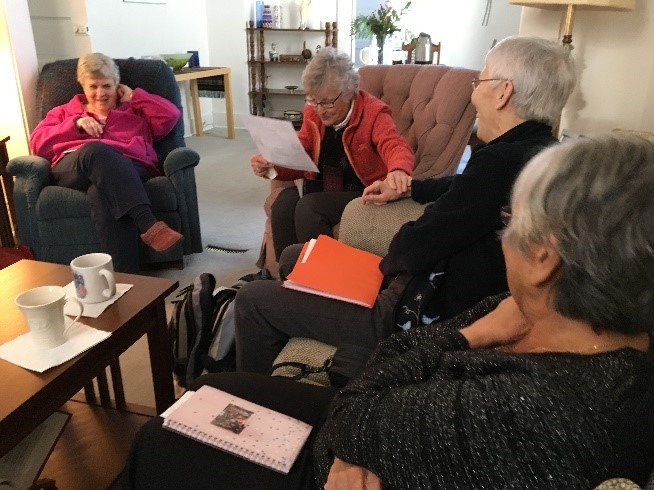
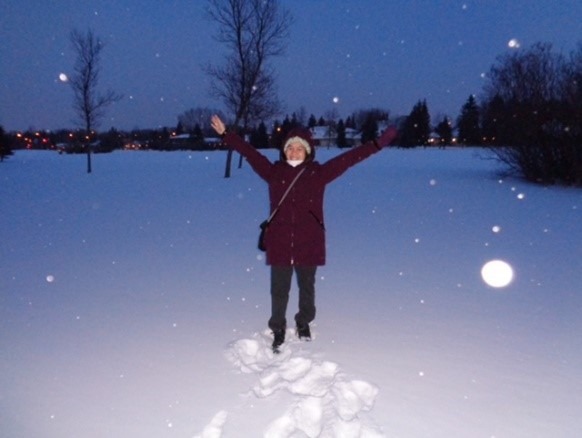
The weather here is different than where I used to live. In the winter time, everywhere is white because of snow. I love seeing snow falling down; it is so beautiful. The weather is extremely cold but I received a warm-hearted welcome from people.
Challenging...
The first year was not easy for me; I was doubting myself a lot. Why? Because when I came here, the government did not give me any visitor Record so I had to go to the border to obtain one. They gave me only one month. During that time I needed to apply to extend that. It was so stressful. Finally with the help of the Sisters I could submit it the day before my Visitor Record expired.
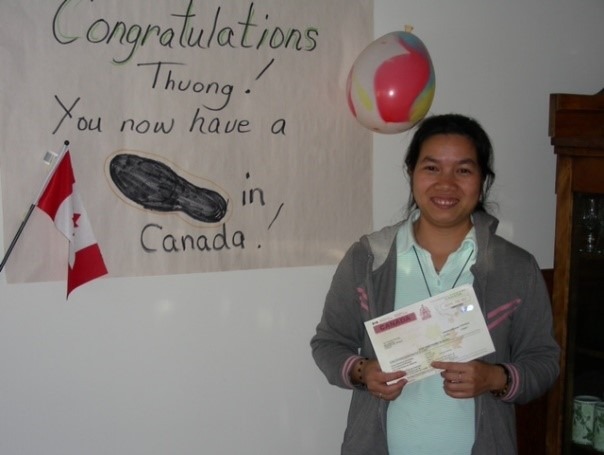
It seemed to be one thing after another; next it was my health. The doctor discovered a small tumor in my pituitary gland. I was terrified and filled with panic, just like the disciples when they saw Jesus and thought it was a ghost. I consoled myself, “Everything will be okay. I am sure I am not alone. God is always with me even though I don’t see Him; I am still in God’s hands, no doubt about that”. During this time I felt overwhelmed by the struggle, and questioned why God seemed to abandon me. I could not see God’s hand in anything or anyone, even myself. I was in a very dark place, and God was very far away. Then I allowed a light to come and I could see everything very clearly, even my shadow. Yes, God is good. God was training me to be patient with myself so He could use me for mission.
Thankfulness
Some important helps for me were the many chances to improve my English. I have many teachers to teach me especially sister Betty Iris Bartush, my special teacher. I learned a lot from her, not only English but other things as well. She is very warm-hearted, gentle, caring, patient, and has a good sense of humor. She is like a grandma teaching her grandchild how to read, or like a mother taking care of her child as she learns to walk. I have more confidence because of the Sisters who always supported and encouraged me. They usually say “You can do that!”. With those words I would then try my best.
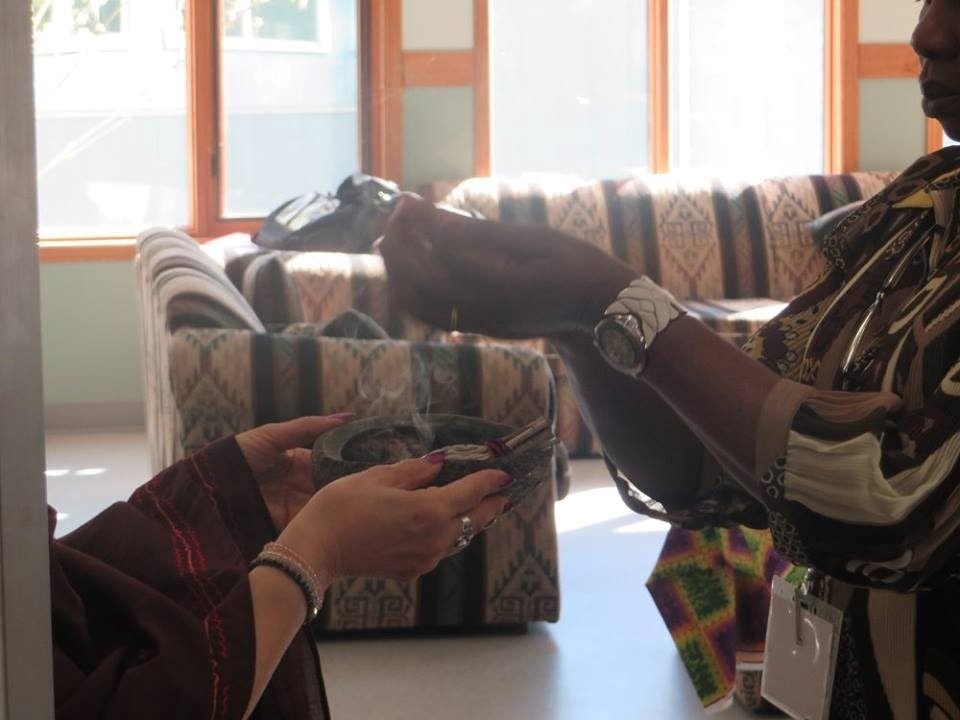
Gradually I settled myself in. I work at St. Kateri Parish which is an Indigenous community. They are very shy and not confident in themselves, but they have a warm and soft heart. They are very fragile so they are very easily hurt because of their experiences in Residential Schools. One thing I can do is be present with them and listen to their stories with all my heart. It can help them to release their pain and sorrow. They are very connected with nature, Mother Earth. They use sweet grass, ceder, tobacco and sage to smudge because they believe it will clean their mouth to speak beautiful words, their mind to think the good thoughts, their heart to open for people, and their ears to listen for good things. With all their heart, they do drumming to offer everything to God.
The first thing I learnt from them was how to make a dream catcher. This taught me to be patient and to learn from my mistakes because I needed to undo it many times. I was surprised when one mistake turned out perfectly; this made me realize that not every mistake is bad. What is the important thing that holds dream catchers together? Can you guess? It’s a very tiny thread. It seems to be nothing but it is very important and holds the entire thing together.
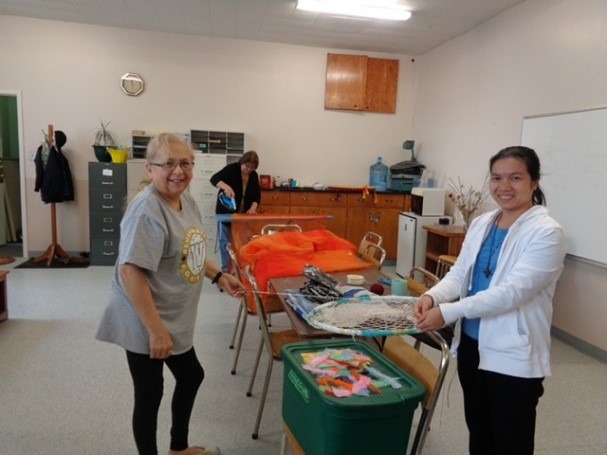
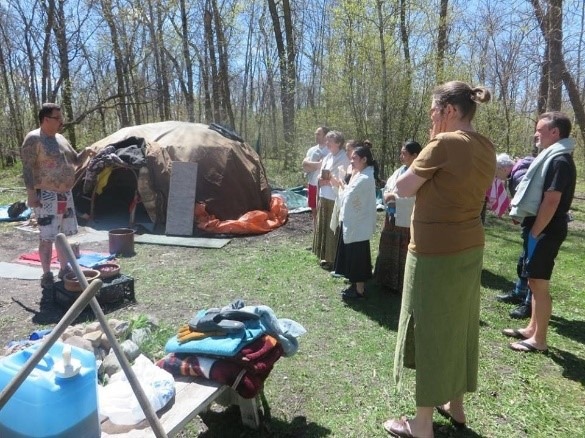
Beside that I learned another thing too. I was in a Sweat lodge. Inside it was very hot with hot stones; I was breathing very hard, but gradually I managed myself. It was just like I was in my mother’s womb, so warm and comfortable. When I came out from the sweat lodge, I felt I was born again; I had a new life. It was so refreshing, so amazing.
The Catechesis of the Good Shepherd, based on the Montessori System, helps children discover Jesus. I was trained and used this system with the children at Kateri. This helped me to know the children better and develop a deeper relationship with God for myself.
I cannot do anything during COVID time but I received many good things: care for each other in many ways, more time to reflect and mediate, fresh air, and etc…
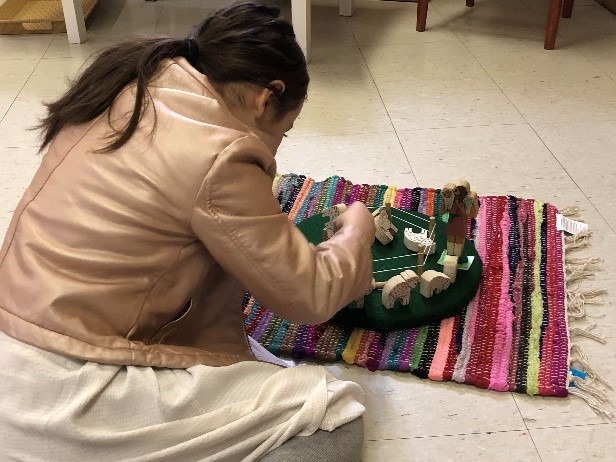
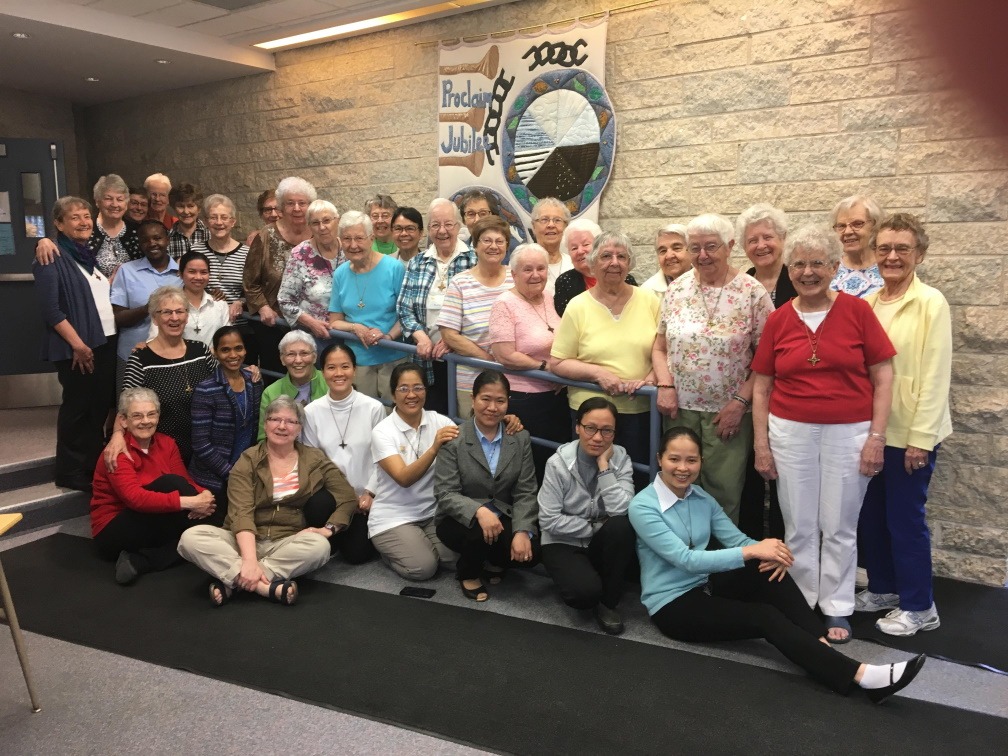
I am very grateful and happy that whatever I do and wherever I go, I am not alone. God is always with me, guiding me and supporting me, especially through all the Sisters and people. I believe I am in God’s hands.
Thuong Truong RNDM
Sisters of Our Lady of the Missions
393 Gaboury Place
Winnipeg, MB
Canada
R2H 0L5
Phone: (204) 786-6051
Fax: (204) 691-0640
